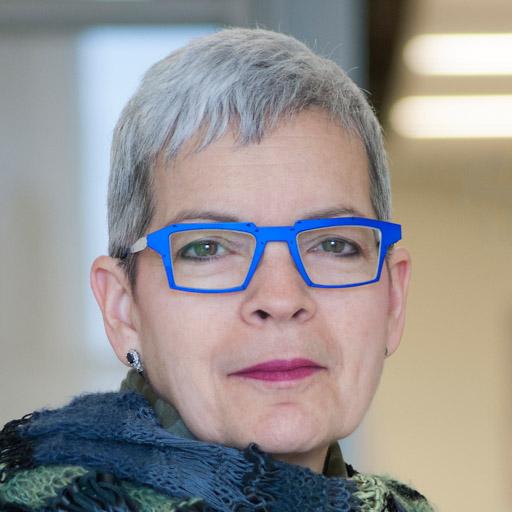
Rhona Richman Kenneally, PhD (Architecture)
- Distinguished Professor Emerita, Design and Computation Arts
- Member, Textiles and Materiality Cluster, Milieux Institute
- Chair, Dept. of Design and Computation Arts (2010-12)
- Academic Co-Founder and Fellow, School of Irish Studies
- 2019 Recipient, Presidential Distinguished Service Award for the Irish Abroad
- Concordia Alumni Award for Excellence in Teaching, 2015
- Distinguished Teaching Award, Faculty of Fine Arts, 2014
Are you the profile owner?
Sign in to editResearch areas: built environment, food studies, domestic space, Irish studies, Expo 67, fibres and wearables, mindful eating
Contact information
Email:
Biography
Rhona Richman Kenneally is a Distinguished Professor Emerita and former Chair of the Department of Design and Computation Arts, as well as a co-founding professor and Fellow of the School of Irish Studies at Concordia University. She holds a BA in English Literature, an MA in Canadian History and a PhD and professional degree in architecture. She is also the former editor of the Canadian Journal of Irish Studies, and a former co-organizer of a Food Studies Research team under the umbrella of the Centre for Interdisciplinary Studies in Society and Culture.
Education
- BA English Literature
- MA Canadian Social History (thesis title: The Montreal Maternity, 1843-1926: Evolution of a Hospital)
- professional degree, Architecture (thesis title: The Architecture of the Narrative and the Narrative of Architecture: Mycenae comes Homer through Joyce).
- PhD Architecture (thesis title: The Tempered Gaze: Medieval Church Architecture, Scripted Tourism, and Ecclesiology in Early Victorian Britain.
Areas of expertise
domestic space; food systems and networks, Irish and Canadian-Irish identity.
Publications
Selected Publications
The Vibrant House: Irish Writing and Domestic Space (co-editor, LucyMcDiarmid). Dublin: Four Courts Press, 2017.
http://www.fourcourtspress.ie/books/2017/the-vibrant-house/
Reviews:
'Combining poetry,image, personal meditation, and scholarly essay into one beautifully produced volume, The Vibrant House comprises a fascinating and multi-layered examination of some of the foundational images in a literature in which notions of ‘home’, ‘property’, and ‘possession’ can never be simply and uncomplicatedly incidental', Caitríona O’Reilly, Poetry Ireland (2018).
'Setting the mood to house building and what the home really means ... The Vibrant House is a treasure trove of original works ... an inspiring read', Selfbuild Magazine (Summer 2018).
'From the ground surveyed by architectural historians, geographers, and scholars of folk life,this fresh book flowers with a bounty of images,memories, and fine writing to enrich our understanding of the house, the home,and the act of dwelling, while welcoming us into the common Irish homes that stand between the Georgian mansion and the thatched cabin', Henry Glassie, Indiana University.
'By drawing attention to the quotidian materiality of Irish domestic space this engaging book bravely puts together scholarly and non-scholarly approaches to address larger existential questions of belonging. The attention to the visual,spatial and material nature of 'home' is thoughtfully unpacked through discussions of interior architecture, personal memory, fiction, poetry, drama and film, in a variety of tones that invoke reflective questions of interiority, privacy, status and cultural representation. By examining how we connect to, experience and 'see' home, this collection gives us a template for how to overlay textual analysis, memoir, and visual culture in a manner rarely seen within Irish literary or historical studies', Elaine Sisson, Institute of Art,Design and Technology, Ireland.
Read an excerpt of the book in the Irish Times:
Theo Dorgan,“Theo Dorgan: Back to the House My Father Built,” https://www.irishtimes.com/life-and-style/homes-and-property/theo-dorgan-back-to-the-house-my-father-built-1.3334079.
Listen to a discussion of the book on RTÉ Radio One’s current affairs program, Arena: https://www.rte.ie/radio1/arena/programmes/2017/1207/925780-arena-thursday-7-december-2017/
----
The Food Issue, Canadian Journal of Irish Studies
(co-editor, Máirtín Mac Con Iomaire), volume 41, 2018.
Table of Contents:
Rhona Richman Kenneally, "Irish Food: A First Course."
Mark Moriarty, "Anatomy of an Award-Winning Irish Dish:Celeriac baked in barley and fermented hay, hazelnut, celeriac, and smoked hay tea"; includes recipe.
Máirtín Mac Con Iomaire, "Contextualizing the Irish Food Renaissance."
Dorothy Cashman, "Sugar Bakers and Confectioners in Georgian Ireland."
Mary Wack,"Recipe-Collecting, Embodied Imagination, and Transatlantic Connections in an Irish Emigrant’s Cooking."
Elaine Mahon,"Irish Cuisine: Irish Diplomatic Dining."
Helen O’Connell,"Bleak Food: William Wilde, Famine, and Gastronomy."
Tricia Cusack,"'This pernicious tea drinking habit': Women, Tea, and Respectability in Nineteenth-Century Ireland."
Eamon Maher, "'Take and Eat': Links between the Eucharist and Human Flesh in some Twentieth-Century Irish Texts."
Marjorie Deleuze, "'Well, we didn’t pass a bit o’ remarks on it. It was second nature to us': The Rituals of Fasting in Ireland before Vatican II."
Deirdre Byrne, "What’s for Dinner?: Eating Practices in Residential Care Centres for Young People in Ireland."
Eugene O’Brien,"'Sunk past its gleam in the meal-bin': The Kitchen as Locus Amoenus in the Poetry of Seamus Heaney."
Teaching activities
Courses
Selected courses (taught before retirement):
Discursive Design Research
Design History
Design Theory and Practice (Master of Design program)
Encultured Space
The Irish Home: Food, Space, and Agency
Introduction to Irish Material Culture

